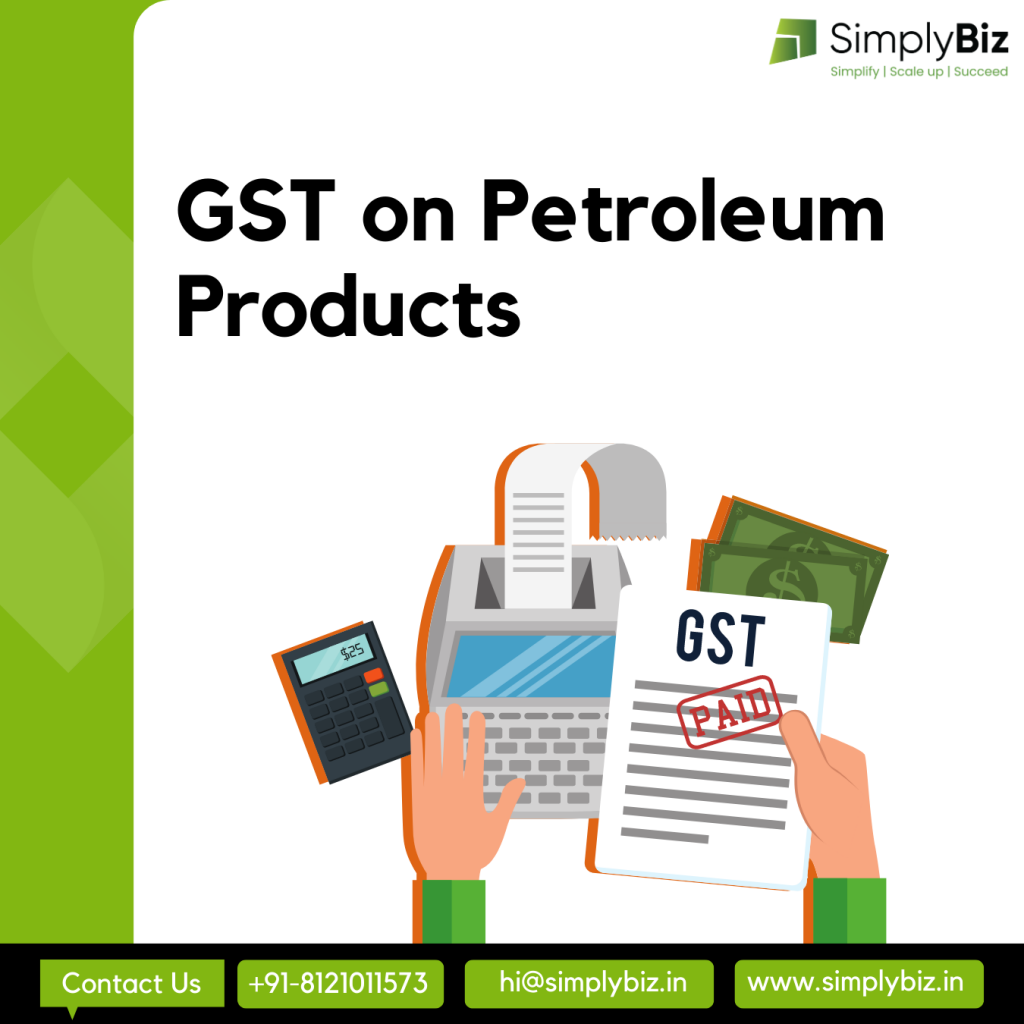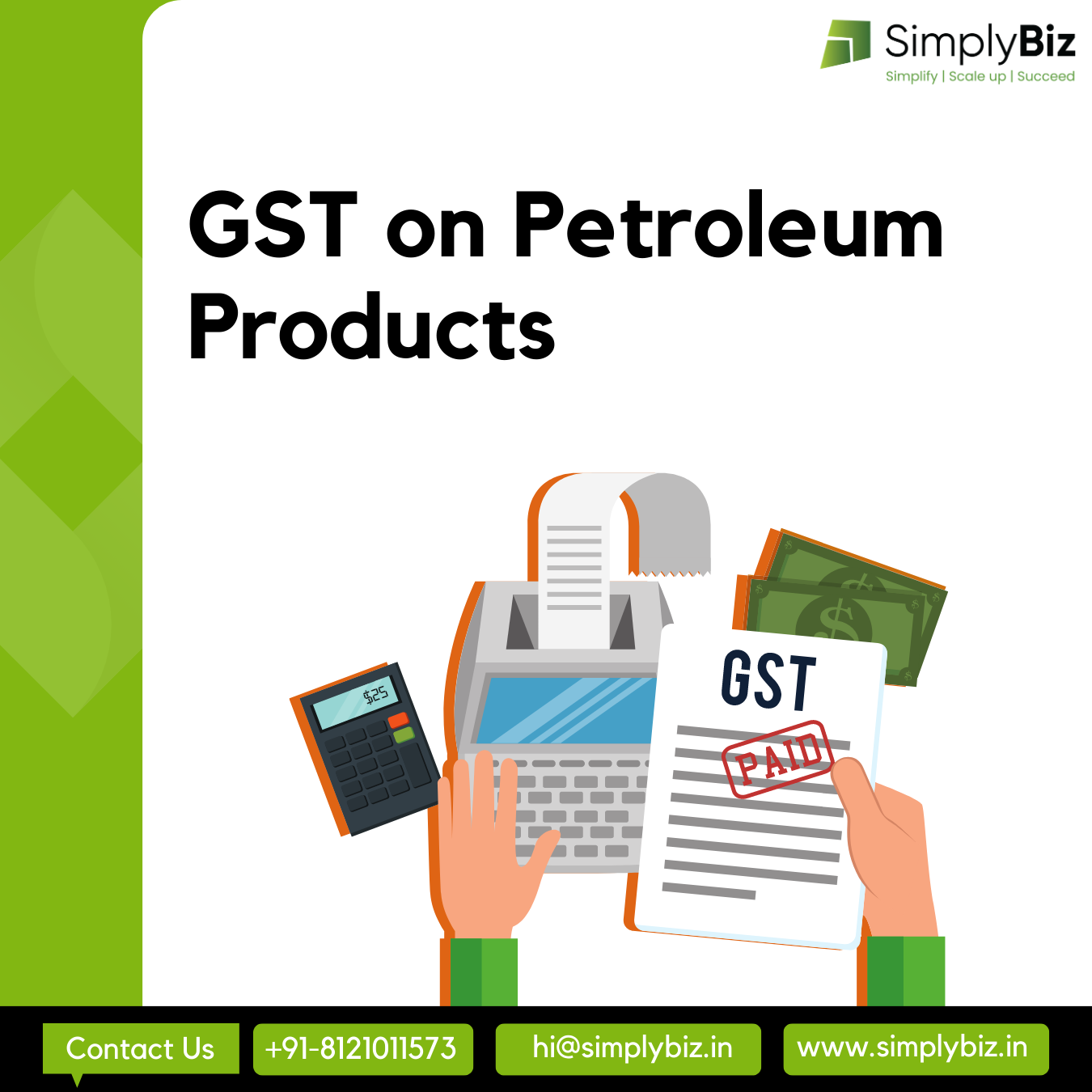GST on Petroleum Products
Contributed By: Shaik Fazal Ahmed
Email id: fazal@simplybiz.in
Introduction
We know today, in the complete world market petroleum and its products hold a huge space. Right from curd oil to kerosene and plastic from the last remains of curd oil. Every country has its own direct and indirect tax applicable for importing it.
In 2022 India has imported petroleum from around the world worth INR 12.078 billion.
Currently in India, Petroleum products are not included in the ambit of Goods and Services Tax (GST). Instead, these products are being taxed in various other forms such as excise duty, customs duty, state Value Added Tax (VAT) and other cesses. Custom Duty, Excise Duty and Cess are set and collected by the Central Government of India, while the VAT is set and collected by Individual States. Consumer is paying all these taxes in the current scenario.
Bringing these products under GST would simplify the tax regime and eliminate multi taxes and levies. Inclusion of petroleum products under GST could result in reduced tax burden for both the consumers and trade bodies. Reduction in compliance cost and administrative cost is an added advantage for Trade bodies.
On the other side, bringing petroleum products under GST would result in revenue loss to the State Governments. The GST rate structure would have to be carefully designed to compensate the revenue loss by the State Government.

Let us have a look how states are taxing Petroleum products.
Delhi levies 19.4% VAT on petrol and 16.75% on diesel.
Telangana levies 35.2% VAT on petrol and 27% on diesel
Rajasthan (31.04%), Andhra Pradesh (31%), Kerala (30.8%), and Madhya Pradesh (29%).
Odisha (24%), (31%), Kerala (30.8%) Maharashtra (24%), and Chhattisgarh (23%)
Intent of Central Government
- The Government of India is planning to get petrol and petroleum products under one GST Umbrella.
- Finance Minister Ms Nirmala Sitharaman on 15th Feb 2023, “Once the states agree, we will have petroleum products in the GST”.
Constitution of India: Goods and Services Tax Council
Article 279A (5) of the Constitution provides that the Goods and Services Tax Council shall recommend the date on which goods and services tax shall be levied on petroleum crude, high-speed diesel, motor spirit (commonly known as Petrol), natural gas, and aviation turbine fuel.
How States responded
Telangana: The then-state finance minister Mr Etela Rajender.
“If the Central Govt. brings Petrol and Petroleum products under the scope of the Goods and Services Tax, the state will incur significant financial losses (GST).
Andhra Pradesh: Opposing to centre’s decision, the state finance minister Mr Rajendranath B. said GST has already affected state revenue by 5%, while earlier it was 14% to 15%, and stated that we oppose the decision of centre and will continue to oppose against bringing petrol and its products under GST.
Karnataka: Govt. of Karnataka has opposed the proposal to bring petrol and its products under the GST umbrella stating that “such a move will lead to substantial revenue loss for states”.
Delhi: Delhi deputy CM Manish Sisodia said the Delhi government has always been in favour of this.
Maharashtra: The then, Deputy Chief and Finance Minister Mr Ajit Pawar has stated that any attempt by the central government to change tax structures, will impact state revenue will be opposed.
Madhya Pradesh: The then Finance Minister, Mr Jayant Malaiya said the government will consider the revenue outcome before reaching a consensus on bringing petroleum products under the GST regime.
Expectations:
- Multiple taxes and levies of state and centre will be replaced with one GST.
- Instead of an average of 42% Tax, under GST, a tax rate of 28% is expected.
- Consumers will be paying a lesser price than they are presently paying for it as below.
Sample calculation for our understanding
Petrol under Excise and VAT | |
| Particulars | Amount (Rs.) per litre |
| A. If Fuel cost (Petrol) (Including freight) | 60.00 |
| B. Excise duty (19.90/litre) | 19.90 |
| C. Dealer’s commission per litre | 3.87 |
| D. Total value (A+B+C) | 83.77 |
| VAT (Delhi) @ 19.4% on D | 16.25 |
| Retail price of petrol (RSP) | 100.02 |
Petrol under GST | |
| Particulars | Amount (Rs.) per litre |
| A. Fuel cost (Petrol) (Including freight) | 60.00 |
| B. Dealer commission per litre | 3.87 |
| C. Total value (A+B) | 63.87 |
| GST @ 28% on C.) | 17.88 |
| Retail price of petrol (RSP) | 81.75 |
If petrol is taxed at 28%, a citizen can save at least Rs: 18.26/- per litre.
To conclude, bring petroleum products under GST is a complex and sensitive issue. While there are advantages and disadvantages, any decision in this regard would need to carefully balance the interest of State, Central, Consumers and Trade Bodies.
SimplyFACT is a product of SimplyBiz where we provide Entity Management Services covering Accounting, Compliance, Taxation, and Payroll. We not only help you with the start-up registration but also with availing Tax benefits. In case you want to know more on the scope of work, please write to our Product Head – M Pavan Kumar at pavan@simplybiz.in or Simplyfact@simplyBiz.in.


Leave A Comment